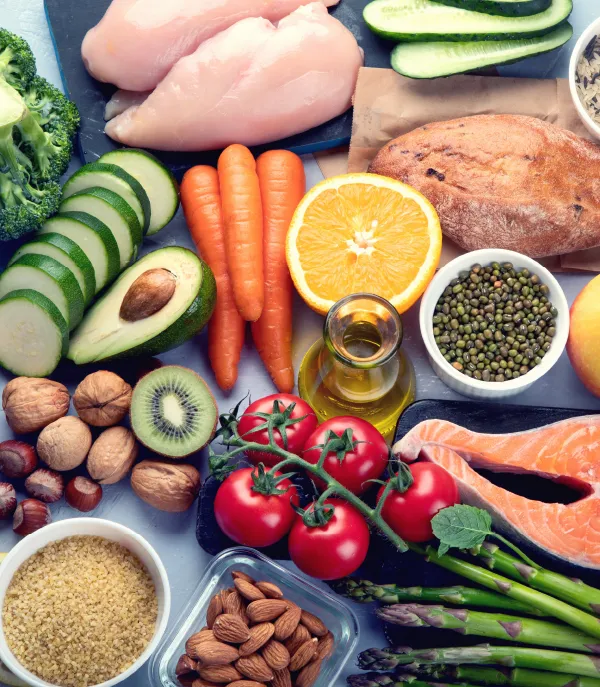We have expert nutritionists and functional medicine practitioners specialising in type 2 diabetes, insulin resistance, metabolic syndrome, weight loss and overall cardiometabolic health.
A Nutrition, Lifestyle, & Functional Medicine Approach to Type 2 Diabetes
Diabetes is on the rise and is said to be the fastest growing health threat of our times. In the UK alone around 3 million people have been diagnosed with diabetes, which is a 100% increase in the last 20 years.
Some of us are more genetically predisposed to developing diabetes than others, however this does not mean you have to accept this as an inevitability. Whilst our genes load the gun, our nutrition and lifestyle habits pull the trigger.
Functional Medicine looks at the root causes behind type 2 diabetes. It helps you to navigate those areas such as nutrition, sleep, stress/emotions, movement etc. We also support you in making lasting behaviour changes, ensuring this is not a short-term fix.
We also run laboratory tests to understand the risks, guide the recommendations and monitor progress from the interventions provided to you. Unfortunately, typical testing is often limited to looking at your glucose levels and HbA1c. This carries with it significantly limitations, particularly when looking at preventing type 2 diabetes as early as possible by detecting issues of insulin resistance.

Interested in working with one of our type 2 diabetes and insulin resistance specialists?
Why do you have high blood glucose levels?
Production
The body produces glucose in the liver. This can come from storage forms of carbohydrate, known as glycogen or it can also be created from proteins and fats. This can then be released by the liver into the blood stream. This process is triggered by a hormone called glucagon and when sugar levels are low or need stabilising this process is crucial. However, chronic increases in glucagon can contribute to chronically elevated levels of blood sugar.
Stress hormones are another factor. Whether the stress is psychological such as our daily demands and emotions or physiological such as exercise or an illness, glucose levels can temporarily increase as a result. There are also certain medications that mimic the effects of the stress hormone cortisol, and this also results in increased glucose levels.
Consumption
This points more towards the foods that we eat. Whilst we can still effectively make glucose out of proteins and fats, a significant influence on our glucose levels is what we eat, especially the carbohydrate quantity and quality.
Higher carbohydrate foods from starches and sugars will raise glucose levels more than proteins, fats, and fibres.
When one has insulin resistance and diabetes, part of managing that will be managing the balance of foods consumed, especially the quality and quantity of carbohydrates consumed. This is where our expert nutritionists are on hand to support your dietary changes.
Clearance
This refers to how efficient we are at clearing glucose from the blood and using it as energy or delivering that glucose to the muscle and liver where it can be stored as glycogen to be used later.
Here are just a few things that influence glucose clearance:
- Insulin production – Influenced by many factors.
- Muscle activity and ability to store more glycogen.
- The sensitivity of our cells to insulin
- Liver and kidney function
Our Functional Medicine approach means we can understand what might be impacting on clearance and put things in place that improve this area.
Our Functional Medicine approach means we can understand what might be impacting on clearance and put things in place that improve this area.
Interested in working with one of our type 2 diabetes and insulin resistance specialists?
How our Nutritionists & Functional Medicine Practitioners can help you reverse type 2 diabetes naturally.

The good news is that there is so much that can be done to help overcome diabetes and what is known as insulin resistance naturally.
Diabetes tends to occur in stages:
- Insulin Resistance
- Prediabetes
- Type 2 diabetes
- Type 2 diabetes further complications such as cardiovascular disease, neuropathy etc
Lifestyle intervention is shown to have the greatest impact in reducing the occurrence of type 2 diabetes. Here are the foundational areas that we work on to overcome and prevent type 2 diabetes.
Weight gain substantially increases the risk of developing type 2 diabetes and even modest weight loss significantly reduces the risk. For someone who is overweight, each kg of weight gained yearly over a 10-year period is associated with a 49% increase in risk of developing type 2 diabetes in the subsequent 10 years. However, each kg of weight loss annually over 10 years is associated with a 33% lowered risk of type 2 diabetes in the subsequent 10 years.
Weight reduction along with diet and exercise intervention, reduces the incidence of type 2 diabetes by 58%. A 5-10% reduction in body weight significantly reduces blood glucose levels, decreases use of diabetes medication, and improves a variety of factors: overall fitness, depression symptoms, sleep quality, cardiovascular risk factors and reducing blood pressure medication use.
Whilst there are medications being utilised for weight loss and diabetes available. The research is clearly showing that to come off these medications and sustain the achieved weight loss and metabolic benefits, changes in one’s nutrition and lifestyle are required. Without this, there is a very strong possibility the weight lost, and metabolic benefits achieved are reversed. We support clients whether they choose to utilise a more medicalised approach to weight loss or not.
Long-term consumption of refined grains, processed foods and sugar-sweetened drinks promote weight gain and increase risk for type 2 diabetes risk. Diets low in fibre and vegetables and high in red and processed meats are also correlated with increase type 2 diabetes risk. Long-term excess energy becomes an overload and stress to the body, contributing to insulin resistance and dysfunctional insulin secretion in type 2 diabetes.
Independent of excess energy, quality and type of food also influence risk for type 2 diabetes: foods higher in trans fats, found in many bought baked goods (cakes, cookies, pies), dough, fried foods and margarine are associated with a much greater risk.
Specifically, diets high in carbohydrates, the macronutrient that raises blood glucose levels the most, have the greatest risk associated with developing type 2 diabetes.
At Steve Grant Health, we like to focus on what you can eat a lot of. This helps to maintain a positive association to the foods you eat but at the same time guides you towards foods that support your health, diabetes, and body composition goals.
We do not believe in one specific dietary protocol/intervention with all our clients for insulin resistance or type 2 diabetes. Our goal is to work with you to figure out what is going to be best for you. Creating an individualised approach and allowing for some flexibility to maintain a happy and healthy relationship to food.
Chronic stress can directly impact glucose levels and indirectly influences choices, such as dietary habits that may negatively impact on glucose management.
High stress can also influence on how fat stores grow and develop, especially the deeper abdominal fat, known as visceral fat.
We look at ways in which we can help to manage your stress levels and perception of stress, helping to reduce the time spent in a fight or flight state.
A review of multiple studies over 3 years concluded that quantity and quality of sleep consistently and significantly predict the risk of developing type 2 diabetes. The lowest risk for developing type 2 diabetes is associated with 7-8 hours per day of sleep and there is an increased risk of 9% for each hour of sleep lost per day per year.
General light exposure throughout the night and blue light exposure pre-bedtime is also strongly associated with increased levels of insulin resistance and thus diabetes risk.
Being inactive, overweight, and having type 2 diabetes are all strongly associated with one another. High versus low total overall physical activity is associated with a reduction in relative type 2 diabetes risk by approximately 30%.
Exercise and planned periods of physical activity significantly enhances insulin sensitivity. It enhances glucose uptake into the muscle, increases blood flow to the muscle, resulting in growth of muscle mass, and reduces levels of fat mass. It also improves mood, well-being, sleep, and general stress levels, all typically helping to improve how we manage our dietary choices.
Our team of clinicians all have strong exercise physiology backgrounds and can assist and advise with the most appropriate exercise for you, based upon what you need and also what you may be capable of and importantly, enjoy!
Interested in working with one of our type 2 diabetes and insulin resistance specialists?
Advanced considerations for the management of type 2 diabetes and Insulin resistance
Gut Health, Our Microbiome & Type 2 Diabetes
Mitochondrial Health & Type 2 Diabetes
GLP-1 & Type 2 Diabetes
Inflammation & Type 2 Diabetes
Genetics & Type 2 Diabetes
Hormonal Changes, Imbalances & Type 2 Diabetes
Bile Acids & Type 2 Diabetes
Glucagon & Type 2 Diabetes
Immunity & Type 2 Diabetes
Learn More About What Our Clients Have to Say

Janet Lyons
I have been labelled as a type 2 diabetic or pre diabetic for nearly 15 years. After a stressful period in my life and losing my way somewhat with my diet and lifestyle, my average blood sugars (HbA1C) had increased from a previous 7.2 to 8.6 and so to my...

Janet Lyons
I have been labelled as a type 2 diabetic or pre diabetic for nearly 15 years. After a stressful period in my life and losing my way somewhat with my diet and lifestyle, my average blood sugars (HbA1C) had increased from a previous 7.2 to 8.6 and so to my cholesterol levels had also gone up, with an increase in weight. The initial reaction from the nurse was to start medication, I asked if she would give me 3 months to try and sort myself out, which she agreed stressing that if there was little or no change then it was for my benefit that I should start ‘medication’.
Following a consultation with Steve, where he reviewed my previous lab test and ran 2 additional lab tests, reviewed my nutrition and current lifestyle and began to formulate a plan. Steve offered weekly support and food diary reviews, and to my amazement doubled, if not tripled the amount of food I was eating. We also used a blood glucometer to test how my bloods were reacting to certain meals, allowing me to manage my blood sugars and understand the effects certain foods were having on them.
After 3 months it was time for my diabetic review and the follow up blood tests. I knew things were going well because I had been tracking my blood sugar levels gradually dropping over the past 3 months, along with my body weight which was now 11kg lighter. To my amazement and the diabetic nurses’ amazement my average blood sugar score over the 3 months had gone from 8.6 down to 6.7, the lowest it had been in years.
The good thing is I know it is not over now, Steve has set me some new goals for when I go for another review in 6 months. I still have to continue with my healthy eating habits, but the best thing is I want to continue. The past three months have completely change how I approach my nutrition and lifestyle, and in such a short time I feel so much better and my self-confidence is now returning.
Nitin
With Danny’s mentorship and know how I have been able to lose close to 9kg of weight with 75% of that being fat. My energy levels haven’t dropped and I have found the hunger and desire to get back into playing football at a high standard.
I first approached Danny as...
Nitin
With Danny’s mentorship and know how I have been able to lose close to 9kg of weight with 75% of that being fat. My energy levels haven’t dropped and I have found the hunger and desire to get back into playing football at a high standard.
I first approached Danny as a type 2 diabetic with the goal of coming off medication and getting my health and fitness back, I did not know what this journey would look like and how I would be able to adjust, however with Danny’s mentorship and know how I have been able to lose close to 9kg of weight with 75% of that being fat. My energy levels haven’t dropped and I have found the hunger and desire to get back into playing football at a high standard. We are well on the way to being diabetic free and I can’t thank Danny enough for this. I look forward to achieving the goals we have set in the short term and the long term to further improve my health and fitness. Would recommend Danny to anyone.

Stay in touch
Subscribe to our newsletter and receive your FREE seasonal recipe ebook




